1 Have you got any oranges 外研英语
八年级英语外研版上册Module 5 Unit 1 Have we got any oranges学案
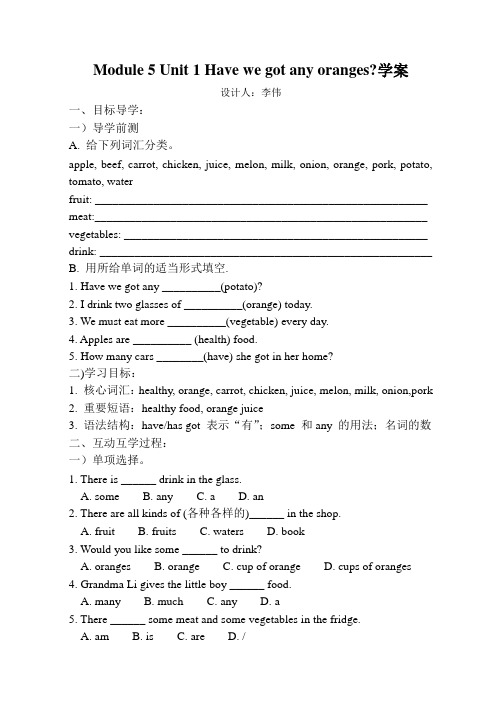
Module 5 Unit 1 Have we got any oranges?学案设计人:李伟一、目标导学:一)导学前测A. 给下列词汇分类。
apple, beef, carrot, chicken, juice, melon, milk, onion, orange, pork, potato, tomato, waterfruit: _________________________________________________________ meat:_________________________________________________________ vegetables: ____________________________________________________ drink: _________________________________________________________B. 用所给单词的适当形式填空.1. Have we got any __________(potato)?2. I drink two glasses of __________(orange) today.3. We must eat more __________(vegetable) every day.4. Apples are __________ (health) food.5. How many cars ________(have) she got in her home?二)学习目标:1. 核心词汇:healthy, orange, carrot, chicken, juice, melon, milk, onion,pork2. 重要短语:healthy food, orange juice3. 语法结构:have/has got 表示“有”;some 和any 的用法;名词的数二、互动互学过程:一)单项选择。
Module 5 Unit 1《Have you got any oranges》课件3(22页)(外研版七年级上)
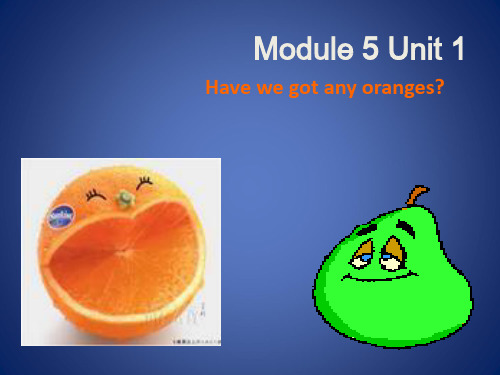
Yes, I have four milks.
X
Have you got any milk? Yes, I have some.
practice
1. There are some___t_o_m__a_to_e(西s 红柿) on the desk.
2. _V_e_g_e_t_a_b_le_s_(蔬菜) are good for us. 3. Have you got any ____m__e(a肉t )? 4. We haven’t got any ____fr_u_i(t水果). 5. These __c_a_rr_o_t(s胡萝卜) are from Xinjiang. 6. Lily has got some _______(果汁).
Module 5 Unit 1
Have we got any oranges?
oranges • Have you got any apples ?
water
• Yes, I have. • No, I haven’t.
Have you got any …? Yes, I have./ No, I haven’t.
A
B
Chicken
milk
coke
pork
Beef
water
X Have you got any chickens?
Yes, I have got two chickens.
Have you got any chicken? Yes, I have got some.
Have you got any milks?
Betty’s mum: Have we ___g_o_t_ acnayrrots? Betty: Yes, ____w_e’vgeot some carrots. Have we got any ____?meat
Module4 unit 1Have you got any oranges教学设计

七年级英语上册(外研版)M5U1Module 5 Healthy food Unit 1Have you got any orange?一、说教材:1、本课时的教学内容是外研版七年级上册,Module 5 Healthy Food的Unit 1Have you got any orange?Module 5Unit1 是关于饮食的话题。
通过本课时的学习,学生用英语表达出食品和饮料,根据所掌握的英语词汇进行简单的日常饮食会话。
在教授词汇当中,让学生掌握可数名词和不可数名词,了解some 和any 及have /has got 的基本用法,这一课时为后面关于健康饮食的话题的展开打下基础,在本模块中的地位是举足轻重的。
2、教学目标:①知识目标: 理解和掌握有关食物和饮料的词汇,并能够进行简单的对话;②能力目标: 提高有关健康饮食话题的听力能力,提高谈论饮食话题的口语能力。
③情感目标: 学生在区分healthy food and unhealthy food 的同时,培养了他们健康饮食的良好习惯。
3教学重点:(1) 掌握语言结构——have/has got.(2) 掌握some和any的用法.(3) 掌握食物和饮料的词汇,并区分其可数还是不可数。
.4教学难点: 可数名词与不可数名词.5教法利用启发式教学法、任务型教学法、情景教学法等。
设计理念:在课堂里,我根据教材内容设计出的不同课堂活动任务(task), 根据设计出的不同任务给出相应的提示,引导学生进行pair work 和group work 的训练活动,而且还给学生留出思维想象的空间,启发学生动脑思考(brain—storming), 这样不仅有利于发展学生的求同思维(convergent thinking),更有利于发展学生的求异思维( divergent thinking),也就是发展学生的创新能力。
二、说学情:谈论食物和饮料的话题很贴近生活,学生对此话题很感兴趣,但对其缺乏感性的认识。
外研版英语七上Module5Unit1Haveyougotanyorangesword教案

Unit 1 Have you got any oranges1. Listen again, complete the table and make up a Array dialogue according to the table.Pair workA: Have we got any…?B: Yes, we have got… No, we haven’t…Change these words into plurals.apple melon orange onion carrot potato tomato2. some 和any 区别There is some milk in the cup.I have got some nice monkey stamps.We haven’t got any English classmates.Has he got any sisters?Is there any good news today?你能总结一下some和any 的用法吗?some 用于______________中,any用于___________和_____________some 和any 既可用于可数名词的________________之前,也可用于不可数名词之前。
可数名词若是是单数,加不定冠词,而不可数名词只要表示必然的量就要加________或________.拓展1. some要紧用于____________中。
① 当说话人期待肯定回答或者有意图鼓励说话人作肯定回答时,some可用于疑问句。
Could I have ________more bread, please? 我多拿一些面包可以吗?Would you like __________ more soup? 你还要点汤吗?② some 与单数可数名词搭配,表示未知的人或物,相当于a (an) 或a certain。
外研版-英语-七年级上-1单元 Have you got any oranges(学案)

Module5Unit1. Have you got any oranges?学习目标:To understand conversations involving food and drink To talk about food 学习重点:1.预习P26—27单词2重点短语:orange 一个橘子some 一些水果some ______一些牛肉some 一些洋葱some_______一些西红柿3.重点句子______we got ______juice? 我们有没有果汁?We_____got______milk. 我们没有牛奶。
We______got______carrots. 我们有一些胡萝卜。
要点讲解:Have we got any oranges?①orange作“橘子”讲时,为可数名词There are some oranges in the basket. 篮子里有一些橘子。
②orange作“橘子汁”讲时,为不可数名词。
There is some orange in the bottle. 在瓶子里有一些橘子汁。
③orange还用作形容词,意为“橙色的”Lucy’s skirt is orange. 路西的裙子是橙色的。
课堂练习Ⅰ.根据句首及字母提示补全单词。
1.There are some o______and apples here for you.2.Chicken, potatoes and melons are h_____food.3.Pork and b_____are meat.4.Tom likes v ______very much, like carrot.k and water are healthy d______.Ⅱ.单项选择1.There is _____ juice in the bottle.A.anB.aC.someD.any2.We have some _____ in the fridge(冰箱).A.meat B.meats C.juices ks3.There is some _____ in the bottle.A.rice B.apples C.apples juice D.apple juice4.There are all kinds of _____ in the shop.A.fruit B.fruits C.breads D.book5.There are many _____ and _____ on the table.A.tomatoes;photosB.tomato;photoC.tomatos;photosD.tomatoes;photos6.—Have we got _____egga? ----No,we haven’t got ____.A.some;someB.any;anyC.some;anyD.any;some7.Would you like some _____to drink?A.orangesB.orangeC.cup of orangeD.cups of oranges8.There aren’t any _____ in the basket. A.pork B.beef C.melons k9.---Would you like _____ coffee? ---Yes,please.A.someB.anyC.manyD.a10.---Have they got any apples? ---_____.Can you give them some?A.Yes,they haveB.No,they haven’tC.Yes,we haveD.No,I haven’tⅢ.根据汉语意思完成句子1.他们有一些果汁。
Have we got any oranges PPT课件 外研版

Listen and check (√) the food and drink
they’ve got. (Activity 4)
oranges √ beef
onions
apples √ pork
carrots
melons
tomatoes √ milk
chicken √ potatoes √ juice
•
70、当你的希望一个个落空,你也要坚定,要沉着!
•
71、生命太过短暂,今天放弃了明天不一定能得到。
•
72、只要路是对的,就不怕路远。
•
73、如果一个人爱你、特别在乎你,有一个表现是他还是有点怕你。
•
74、先知三日,富贵十年。付诸行动,你就会得到力量。
•
75、爱的力量大到可以使人忘记一切,却又小到连一粒嫉妒的沙石也不能容纳。
•
39、人的价值,在遭受诱惑的一瞬间被决定。
•
40、事虽微,不为不成;道虽迩,不行不至。
•
41、好好扮演自己的角色,做自己该做的事。
•
42、自信人生二百年,会当水击三千里。
•
43、要纠正别人之前,先反省自己有没有犯错。
•
44、仁慈是一种聋子能听到、哑巴能了解的语言。
•
45、不可能!只存在于蠢人的字典里。
•
1、再长的路一步一步得走也能走到终点,再近的距离不迈开第一步永远也不会到达。
•
2、从善如登,从恶如崩。
•
3、现在决定未来,知识改变命运。
•
4、当你能梦的时候就不要放弃梦。
•
5、龙吟八洲行壮志,凤舞九天挥鸿图。
•
6、天下大事,必作于细;天下难事,必作于易。
新概念英语第一册课后练习题及答案:109-110

新概念英语第一册课后练习题及答案:109-110Written exercises书面练习A Complete these sentences using much, many, less or fewer.完成以下句子,用much, many, less或fewer填空。
1 I haven't got any pens. I haven't got ______either.2 I've got some money. I've got ______ than you have.3 I haven't got any money. I haven't got ______ either.4 I've got some books. I've got______ than you have.B Answer these questions.模仿例句回答以下问题。
Examples:Have you got any coffee? ---- I haven't got much coffee.I've got very little.Have you got any biscuits? ---- I haven't got many biscuits. I've got very .1 Have you got any jam?2 Have you got any potatoes?3 Have you got any oranges?4 Have you got any vegetables?5 Have you got any meat?6 Have you got any money?C Write new sentences.模仿例句将以下句子改成比较级。
Example:I've got some coffee.I've got mare coffee than you have.1 I've got some soap.2 I've got some fruit.3 I've got some books.4 I've got some presents.5 I've got some eggs.6 I've got some stationery.D Write new sentences.模仿例句改写以下句子。
外教研版英语Unit l Have we got any__ oranges
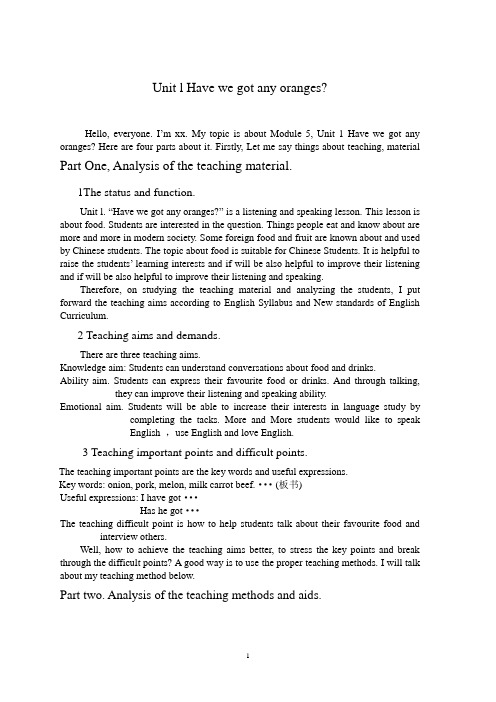
Unit l Have we got any oranges?Hello, everyone. I’m xx. My topic is about Module 5, Unit 1 Have we got any oranges? Here are four parts about it. Firstly, Let me say things about teaching, material Part One, Analysis of the teaching material.1The status and function.Unit l. “H ave we got any oranges?” is a listening and speaking lesson. This lesson is about food. Students are interested in the question. Things people eat and know about are more and more in modern society. Some foreign food and fruit are known about and used by Chinese students. The topic about food is suitable for Chinese Students. It is helpful to raise the students’ learning interests and if will be also helpful to improve their listening and if will be also helpful to improve their listening and speaking.Therefore, on studying the teaching material and analyzing the students, I put forward the teaching aims according to English Syllabus and New standards of English Curriculum.2 Teaching aims and demands.There are three teaching aims.Knowledge aim: Students can understand conversations about food and drinks.Ability aim. Students can express their favourite food or drinks. And through talking, they can improve their listening and speaking ability.Emotional aim. Students will be able to increase their interests in language study by completing the tacks. More and More students would like to speakEnglish ,use English and love English.3 Teaching important points and difficult points.The teaching important points are the key words and useful expressions.Key words: onion, pork, melon, milk carrot beef.···(板书)Useful expressions: I have got···Has he got···The teaching difficult point is how to help students talk about their favourite food and interview others.Well, how to achieve the teaching aims better, to stress the key points and break through the difficult points? A good way is to use the proper teaching methods. I will talk about my teaching method below.Part two. Analysis of the teaching methods and aids.1Analysis of the students.Students are the most important part in the class, so we must make our teaching atmosphere relaxing and happy to make the students as hosts in the class So I must conduct them correctly and try to improve their abilities of listening, speaking, reading and writing.2 The teaching method.In this lesson, some important teaching methods will be used by me. Such as, “Communicative”teaching method, “Audiovisual”teaching method, “Task—based”teaching method and “Listening and saying” teaching method. Because it’s well—known that the main instructional aim of learning English in the Middle School is to cultivate students’ abilities of listening, speaking, reading and writing and their good sense of the English language.3 Teaching aidsBlackboard, tape, recorder, multi—media computer.In order to realize the teaching procedure systematically and properly, I have disigned the following steps to train the students' ability of listening, speaking, reading and writing, especially speaking ability.Part Four Teaching procedures.Step 1 Warming up.Let students have a free talk, then tell us what she or he had yesterday. Is it your favourite food? (Heat the classroom’s atmosphere.)Step 2 Lead in.Introduce some interesting facts to them.①7% of Americans eat in McDonalds every day.②Britain’s most popular snack food is potato crisps.③The largest hamburger in the world weighed 2,503Kg.The purpose is to let students know some interesting facts and train their listening abilities.Step 3. learn the new words, identify the countable and uncountable words.The method is using the multi—media computer. Show a scene to the students.There is a teacher and his students in a big supermarket. There are all kinds of things in it When they get into the food section suddenly one student points at onions and asks, “Sir, What are they?” The teacher tells them, “They are onions.” And let them count how many onions there are. One onion, two onions, three onions···Then teacher introduce some other things to them, such as beef, pork, carrots···In this part, the teacher must let students identify which words are countable, which are not. If the students can’t understand, teacher can give them some examples. We can say one apple, two apples, one pen, two pens, but we can say one beef, two beefs, one milk, two milks. So pen, apple are countable nouns, beef, milk are uncountable nouns.It is much easier for students to understand the words, and grasp the grammar by watching and listening. And if they can identify the countable and uncountable words, later, they can use “some” or “any” easily.Step 4 PracticeHere are two tasksThe first one: Suggest the students to make vocabulary lists with words arranged in related groups. (Explain that it is much easier to remember words when similar ones are together, rather than when there is a random list.) Thus they could have a page in their notebook with a heading FOOD. Then different groups of words with subheadings (eg, meat) and then the specific words (eg, chicken, pork, beef`···) They can then add to this list when they find other related words.( 教师可事先准备好写有单词的卡片,让学生放进适当的表格中。
have you got any orangesppt教学课件
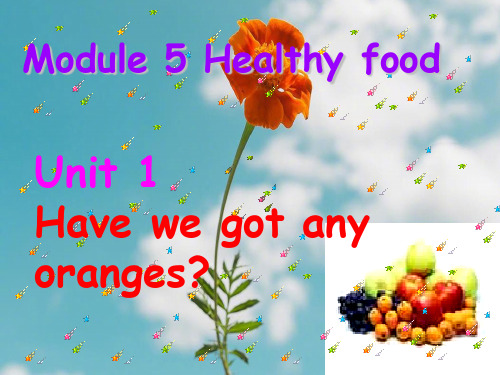
meat
chicken
pork
beef
drink
a glass of
juice
a box of
milk
a bottle of
water
carrot juice onion potato milk melon oranges apple beef pork chicken tomato water fish banana pear
臧克家其人
▪ 臧克家(1905~ ) 现代诗人。山东诸城 人。有诗集《烙印》(1933)、《罪恶的黑 手》(1934) 。代表作《有的人》 。
▪ 前期诗歌以经过锤练的诗句,抒写旧中国 农民的苦难与不幸,勤劳与坚忍,具有真 实、精练、含蓄的艺术风格,能让读者从 咀嚼和回味中体会诗人深沉的感情
臧 克 家
从社会背景上看
老马=受苦受难的旧社会的农民
一匹老马悲苦下的生活,却象征地概括了多 少年来农民背上的苦难的重荷
▪ 从表面上看,写的是一匹负重受压、苦痛无 比、在鞭子的抽打之下,不得不向前挣扎的 老马
老马的形象塑造,舍其形而传其神
没有详细描写老马衰弱病残的外形,而是着 重于写它的命运,感受和心境
《老马》简短八句,塑造了一个不堪
重负的老马的悲惨形象。
▪ 第1节,写装车
侧面表现出主人贪婪、残忍,让老马超负荷运载, 同时也写出老马倔强、坚忍的性格,把一腔悲愤 深埋在心里。后两句实写装车,一个“扣”字, 一个“重”字,把老马负重受压的惨状刻画得极 为生动、深刻,主人的冷酷,老马的痛苦,都包 含在其中了
Yes, they have. / No, they haven’t. 4. Have they got any apples?
外研版-英语-七上-1单元 Have you got any oranges(学案) (2)

Module 5 Unit 1 Have you got any oranges?Ⅰ.Check the new words.1.Look at the pictures. Say the English words.2. Complete the words and say the Chinese meanings.Ⅱ.Learning Aims.1.To master the new words.2. To understand(理解) conversations(对话)involving(含有)food and drink.3. To use “have/has got” “some/any” freely.4.To eat healthy food.Ⅲ.Learning steps.Step 1 Warming –up:Look at the pictures, answer:What’s your favorite food/ drink/meat。
?Step 2 Listening practice 1.★1.Lis ten. Check(√) the food and drink they have got .oranges□ apples□ melons□ chicken□beef□ pork□ tomatoes□ potatoes□onions□ carrots□ milk□ juice□★2.Listen again. Fill in the blanks.A: Have we got any fruit?B: We’ve got some oranges, and some apples.We haven’t got any ______.A: Have we got any meat?B: Yes, we’ve got some chicken. We haven’t got any_______.A: Have we got any ______?B: Yes, we’ve got some tomatoes.A: Have we got any potatoes?B: Yes, we’ve got some ______.We haven’t got any _______.Step 3 Listening practice 2 .★ 1.Listen to the tape. Check(√) “Yes” or “No”★2.Listen again and underline the correct answers.(1) They have got some juice/milk.(2)They haven’t got any carrots/meat.(3) Have they got any melons? Yes, they have./ No, they haven’t.(4) Have they got any apples? Yes, they have./ No, they haven’t.Step 4.Speaking practice.1.Make sentences like this:(1) I have got some ……(2) I haven’t got any ……(3) Have you got any ……?Yes, I have. / No, I haven’t.(4) Has he/ she got any ……?Yes, he/she has. / No, he/she hasn’t.2.A any……?B: Yes, I have / No, I haven’t.C: Has he/ she got any ……?D: Yes, he/she has. / No, he/she hasn’t.3.Make a conversation with your partner(同伴).There is going to be a fashion show (时装秀) this Sunday in ourschool, ask your partner:A: What beautiful clothes have you got ?.B: I’ve got ……4.Find the importances(重点) and difficulties(难点)in the conversations.▲教师点拔:A:have/has got 句式的变化规则。
外研版英语七年级上册Module4 Healthy food知识点总结
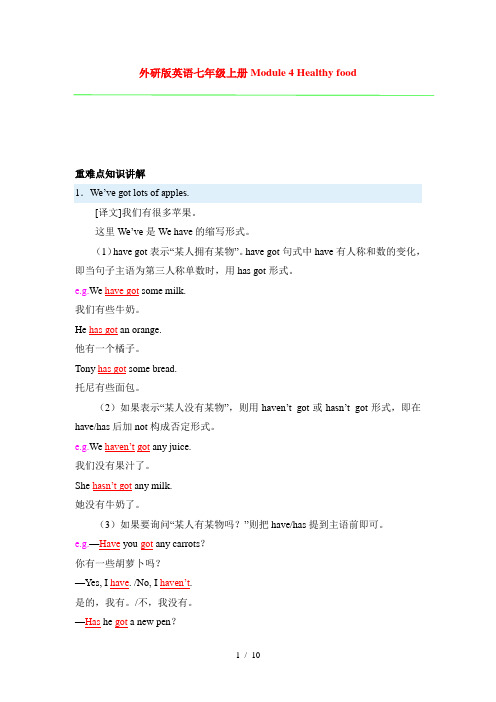
重难点知识讲解1.We’ve got lots of apples.[译文]我们有很多苹果。
这里We’ve是We have的缩写形式。
(1)have got表示“某人拥有某物”。
have got句式中have有人称和数的变化,即当句子主语为第三人称单数时,用has got形式。
e.g.We have got some milk.我们有些牛奶。
He has got an orange.他有一个橘子。
Tony has got some bread.托尼有些面包。
(2)如果表示“某人没有某物”,则用haven’t got或hasn’t got形式,即在have/has后加not构成否定形式。
e.g.We haven’t got any juice.我们没有果汁了。
She hasn’t got any milk.她没有牛奶了。
(3)如果要询问“某人有某物吗?”则把have/has提到主语前即可。
e.g.—Have you got any carrots?你有一些胡萝卜吗?—Yes, I have. /No, I haven’t.是的,我有。
/不,我没有。
—Has he got a new pen?他有一支新钢笔吗?—Yes, he has. /No, he hasn’t.是的,他有。
/不,他没有。
(4)there be句型与have/has got句式的区别there be句型和have/has got句式都表示“有”,但两者表示拥有的对象不同。
① there be句型表示“存在”,指“某地/某时有某人/某物”。
e.g.There is a book on the desk.桌子上有一本书。
There are some boys in the room.房间里有一些男孩。
② have got表示“人拥有”,指“某人(拥)有某物”,是一种所有关系。
e.g.I have got a cat.我有一只猫。
She has got some fruit.她有些水果。
新外研版七年级上英语M4-语法课
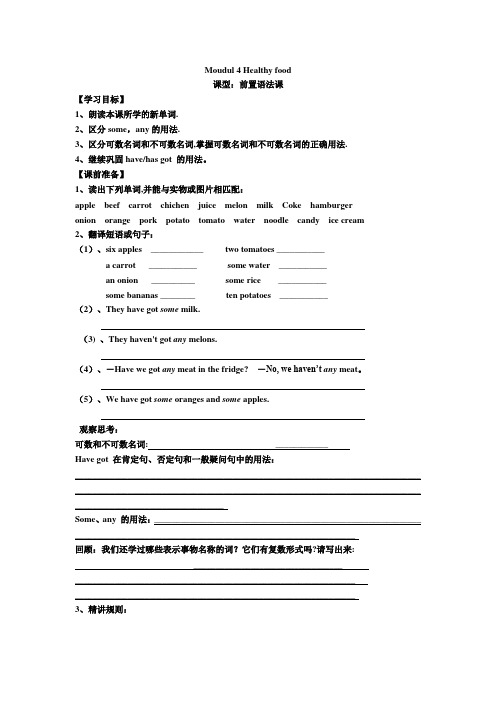
Moudul 4 Healthy food课型:前置语法课【学习目标】1、朗读本课所学的新单词.2、区分some,any的用法.3、区分可数名词和不可数名词,掌握可数名词和不可数名词的正确用法.4、继续巩固have/has got 的用法。
【课前准备】1、读出下列单词,并能与实物或图片相匹配:apple beef carrot chichen juice melon milk Coke hamburgeronion orange pork potato tomato water noodle candy ice cream2、翻译短语或句子:(1)、six apples ____________ two tomatoes ___________a carrot ___________ some water ___________an onion __________ some rice ___________some bananas ________ ten potatoes ___________(2)、They have got some milk.(3) 、They haven't got any melons.(4)、-Have we got any meat in the fridge? -No, we haven’t any meat。
(5)、We have got some oranges and some apples.观察思考:可数和不可数名词: ____________Have got 在肯定句、否定句和一般疑问句中的用法:_______________________________________________________________________________ _______________________________________________________________________________ __________________________________Some、any 的用法:_____________________________________________________________ ________________________________________________________________回顾:我们还学过哪些表示事物名称的词?它们有复数形式吗?请写出来:__________________________________________________________________________________________________________________________________________________________________3、精讲规则:A。
Module 5 Unit 1《Have you got any oranges》课件3(2
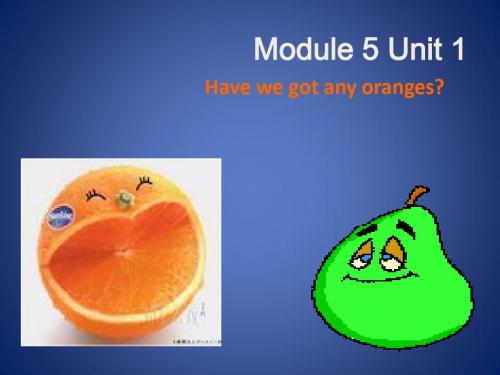
1.Have you got any Yes, I have . No, I haven’t.
2. Have they got any Yes, they have. No, they haven’t.
_w_a_t_e_r __? car_r_o_t_s__?
3.Has he got any Yes, he has. No, he hasn’t.
A. chickenes B. chicken C. chickens
3.I haven’t got any ___,but I’ve got some____.B
A. porks, onions B. pork,onions C. pork, onion
4. We have got ___Aapples.
Betty’s mum: Have we ___g_o_t_ acnayrrots? Betty: Yes, ____w_e’vgeot some carrots. Have we got any ____?meat
Betty’s mum: No, we haven’t. ____Hwavee got ___anmyelons?
• Sentence:
Have you got any …? Yes, I have ./ No, I haven’t.
Homework
• 1.抄写该课单词 • 2.完成书本88页第一题
Thank you.
4. Has Betty got any
Yes, she has. No, she hasn’t .
_t_o_m_a_t_o_es_?
____ห้องสมุดไป่ตู้___ju_i?ce
外研版七年级上册单元测试题Module 3

七年级上册Module 3 基础训练题一、写出下列单词:十五___________ 十九___________ 三十___________ 四十___________ 九十___________ 四十六__________ 体育馆__________ 图书馆__________ 建筑物__________ 字典___________ 图片____________ 科学___________ 实验室_________ 正确的_________ 任何___________二、写出下列短语:在学校前面__________________________ 在那栋楼后面__________________________ 在图书馆旁边________________________ 一些字典_____________________________三、选择填空:( ) 1. There _____________ some birds in the tree.A. isB. areC. be( ) 2. There ____________ some milk in the bottle.A. areB. beC. is( ) 3. Some cups _______________ on the desk.A. amB. isC. are( ) 4. Is there _______________ dictionary in the classroom?A. anyB. someC. a( ) 5. Are there ______________ pictures on the wall?A. aB. someC. any( ) 6. There ______________ any computers in the science lab.A. areB. isn’tC. aren’t( ) 7. There ________________ a cup and two books on the desk.A. isB. areC. have( ) 8. My mother works in _____________ office.A. aB. anC. /( ) 9. My father works in _____________ university.A. /B. aC. an( ) 10. My school is behind the hospital, so the hospital is _______________ my school.A. inB. in front ofC. next to( ) 11. There _______________ a university in our city.A. areB. aren’tC. isn’t( ) 12. Are there any photos in your bag? No, ______________.A. I am notB. they aren’tC. there aren’t( ) 13. Is there an old car under the tree? Yes, _______________.A. it isB. he isC. there is( ) 14. How many people are there in _______________ family?A. heB. hisC. him( ) 15. This is _______________ university.A. meB. weC. our( ) 16. _____________ parents are at home today.A. TheyB. HeC. Their( ) 17. There are ________________ girls in the classroom.A. aB. someC. any( ) 18. The science labs are next to the library. _______________ very big.A. It’sB. There’reC. They’re( ) 19. Where’s _________________ bookshop?A. aB. theC. /( ) 20. ---What a nice picture!---Thanks. It’s a photo _______________ my family.A. ofB. forC. in四、根据首字母,完成单词,使句子意思完整、通顺:1.I am in front of Meimei, so Meimei is b__________ me.2.We can borrow books in the l_____________.3.There isn’t a___________ food in the fridge. Let’s go and get some.4.I like art and I often draw p____________.5.This box is too small. Do you have a big o___________?五、完成句子:1.科学实验室在哪里? 它在图书馆前面.____________________________ the science lab? It’s _________________________ the library.2.树上有些花.____________________________ flowers on the tree.3.书包里一本书都没有.____________________________ in the schoolbag.4.体育馆里有学生吗?有.____________________________ students in the gym? Yes, ___________________.5. 佛山有多少间宾馆?____________________________________ in Foshan?六、根据首字母,完成单词,使短文意思完整、通顺:Look at this picture, please. It is a________ English school. The students a_________ eleven to eighteen years old. T_________ are thirty-six classrooms and six science l____________. There’s a gym, a l__________ and a dining hall. It’s a nice school.Keys:一、fifteen, nineteen, thirty, forty, ninety, forty-six, gym, library, building, dictionary, picture, science, lab, right, any二、in front of the school, behind that building, next to the library, some dictionaries三、1-5: B C C C C 6-10: C A B B B 11-15: C C C B C 16-20: C B C B A四、behind, library, any, pictures, one五、1. Where is, in front of2. There are some3. There isn’t a book4. Are there any, there are5. How many hotels are there六、an, are, There, labs, libraryModule 4 基础试题A.单词拼写:1. Let’s go shopping for food and _______ (饮料).2. We haven’t got an y _______ (肉).3. Let’s get some _______ (鸡肉).4. Have you got _____ (一些) chocolate?5. What _______ (种类) of fruit do you like best?6. Let’s get some _______ (咖啡) for mum.7. How about some apple _______ (果汁)?8. There are lots of _________ (西红柿) in the basket.Keys:1.drink2. meat3. chicken4. any5. kinds6. coffee7. juice8. tomatoesB. 按要求改写句子:1. There is some fish on the plate .(改为否定句)________________________________________________________2. We have got some oranges .(改为一般疑问句)________________________________________________________3. They have got some milk and water .(改为否定句)________________________________________________________4. There is a tomato on the table .(改为复数形式)________________________________________________________5. He has got a potato .(改为复数形式)________________________________________________________Keys:1. There isn’t any fish on the plate.2. Have you got any oranges?3. They haven’t got any milk and water.4. There are some tomatoes on the table.5. They have got some potatoes.C. 完成句子1. 吃太多巧克力对你不好。
外研版英语七年级上学期语法专题复习 havegot用法及练习(有答案含解析)

外研版英语七年级上学期语法专题复习Have got的用法1.定义:have got “表示某人有某物”,如:I have got a brother.注意:如果主语是第三人称或者单数时,就要用has got,如:He has got a brother.2.否定句:(直接在have/has 后+not,缩写为haveift/hasn't),如:I haven't got a brother.He hasn't got a brother.3.一般疑问句:(直接把have/has提前,人称一变二),如:Have you got a brother?Has he got a brother?4.have/has got 与have 的区别:have/has got与have都可以表示“有”,主要的区别就是:have在变否定和疑问句时要助动添,但have/has got变否定和疑问句时,直接在have/has后加not或提前have/has ,如:I have got a brother.否定:I haven't got a brother.一般疑问句:Have you got a brother? Yes , I have/no, I haven'tI have a brother.否定:I don't have a brother.一般疑问句:Do you have a brother?have got练习(含解析)【知识点】any、一般疑问句及回答29.【答案】Has; got; any【知识点】三单、any、一般疑问句及回答30.【答案】Have; any【知识点】any、一般疑问句及回答31.【答案】Have; got【知识点】一般疑问句及回答32.【答案】Has; got; any【知识点】三单、一般疑问句及回答33.【答案】hasn't; got; any【知识点】否定句、any34.【答案】Yes; I; have【知识点】一般疑问句及回答35.【答案】Has; got; any【知识点】any、一般疑问句及回答36.【答案】hasn't; got; any【知识点】否定句37.【答案】Has; got; any【知识点】一般疑问句及回答、any38.【答案】Have; you; got【知识点】一般疑问句及回答39.【答案】No; I; haven't【知识点】一般疑问句及回答40.【答案】haven't; got; any【知识点】否定句41.【答案】has; got【知识点】肯定句42.【答案】haven't; got; any【知识点】否定句43.【答案】Have; got; any【知识点】一般疑问句及回答、any 44.【答案】have; haven't【知识点】一般疑问句及回答45.【答案】Has; got; any; No; hasn't【知识点】一般疑问句及回答46.【答案】Has; got; any【知识点】一般疑问句及回答47.【答案】haven't; got; any【知识点】否定句、any48.【答案】he; has【知识点】一般疑问句及回答49.【答案】hasn't; any【知识点】否定句、any50.【答案】hasn't; got; any【知识点】否定句、any_、选择题1. —Have you got any pens?.They are on my desk.Oh, what's it about?some good friends in China and she often visits them.6. —Have you got any pens?.They are on my desk.7. —Has he got a new bag?.And the bag is green.A. does; gotB. do; haveC. have; gotD. has; got—No,A. Have; she has A. Yes, he has B . No, he hasn't C. Yes, he is D. No, he isn't8. Candy and Tinatheir new flats. And theywork hard. 9.A, has got; both B. have got; bothC. has got; allD, have got; allClaire loves shopping on line. How many new dresses she10. your sister got apples?A. Yes, I amB. No, I'm notC. Yes, I haveD. No, I haven't2.the children got anything to drink?—Yes, everyone got a cup of milk. A. Has; hasB. Have; haveC. Has; haveD. Have; has3. —Have you got any melons?A. Yes, we do.B. Yes, we have. C ・ No, we don't. D. No, we have.4. —Hea new book.A. have gotB. haven't gotC. has gotD. hasn't got5. BettyA, has gotC. haveD. have gotA. Yes, I amB. No, I'm notC. Yes, I haveD. No, I haven'tB. Has; she hasC ・ Have; she hasn*t D. Has; she hasn't11.—_____ s he ______ a cute dog?一No, she hasn't.A. Have; gotB. Has; got12.She _____ got any chocolate.A. haveB. has13.一Has Lucy got any milk?.A. Yes, I doC. No, she hasn't14.Lily and I _____ a new computer.A. there isB. there areC. Do; haveC.haven'tB. Yes, there isD.No, Tm notC ・ has gotD. Does; haveD. hasn'tD, have got15. We _____ any oranges, so let's go shopping to get some.A. haven't gotB. has16. —____ y ou _____ a brother?—Yes, I _____ .A. Have; got; haveC. Do; got; do C.hasn't gotB. Are; have; doD. A and BD. have17. —Have they got any carrots?,they . They have got some tomatoes.A. Yes; doB. No; don'tC. Yes; haveD. No; haven't18.He can't get into the room. He ____ a key.A. hasn't gotB. doesn't19.一Have they got any bananas?—. Can you give them some?A. Yes, we haveC. Yes, they have C.isn'tB. No, I haven'tD.No, they haven'tD. aren't20. 一Have they got any carrots?—. Can you give them some?A. Yes, they haven't C. No, they haven*tD. No, they have21. Tony, let*s go shopping for food and drink. Now, we ____ any meat.A, haven't gotB. have gotC. got 二、填空题22. Tony has got a lovely dog.(改为否定句)Tony _________ a lovely dog. 23. Have you ____ (get ) a new book? 24. Do you have any brothers?(改为同义句)_____________ any brothers?25. 一Have you got any juice, Kate?(作否定回答)—No, ________ .26. Pve got some pears.(改为一般疑问句)___ you __________ pears?27. Li Lei has got some friends from England.(改为否定句)Li Lei ______________ friends from England.28. Pve got some questions to ask in the class.(改为一般疑问句)___ you got ____ questions to ask in the class? 29. Nancy has got some orange juice.(改为一般疑问句)___ Nancy __________ orange juice?30. Fve got some questions to ask in the class.(改为一般疑 I 可句)___ you got ____ questions to ask in the class?31. We*ve got chicken at home.(改为疑问句)___ you ____ chicken at home?32. My father has got some meat for lunch.(改为一般疑问句)___ your father __________ meat for lunch? 33. She has got some meat.(改为否定句)Shemeat.B. Yes, they've D. hasn*tgot34.Have you got any fruit juice?(作出肯定回答)35.Tony has got some milk.(改为一般疑问句)___ Tony __________ milk?36.She has got some interesting news.(改为否定句)She ______________ interesting news.37.She has got some good friends in her new school.(改为一般疑问句)___ she __________ good friends in her new school?38.I have got a new book.(改为一般疑问句)_____________ a new book?39.Have you got a nice bike as a birthday gift?(作否定回答)____ , ___ ___ •40.There isn't any meat in the fridge.(改写为have got 句型)We _______________ meat in the fridge.41.Tom has a lovely dog.(写出同义句)Tom __________ a lovely dog.42.They have got some water.(改为否定句)They ______________ water.43.They have got some onions.(改为一般疑问句)___ they _________ onions?44.Have they got any melons?(作肯定及否定回答)Yes, they ___ . / No, they ____ .45.Maria has got some apples.(改为一般疑问句并作否定回答)—___ Maria __________ apples?—,she ___ .46.Mary has got some milk.(改为一般疑问句)___ Mary _________ milk?47.We have got some apples.(改为否定句)We ______________ apples.48.Has the boy got any sisters?(作肯定回答)Yes, _________ .49.Tony has got some apples.(改为否定句)Tony ____ got ____ apples.50.Emma has got some tea in the cup.(改为否定句)Emma ______________ tea in the cup.答案选择题1.【答案】C【解析】此题考查的是句型与回答。
外研新标准七年级上Module 4 Healthy food Unit1

Tony: 好吧!给妈妈买咖啡,给我买可乐。我没有可乐了。
vegetables
apples beans
fruit
coffee oranges tomatoes
peaches
water carrots
tea
p{o}tatoes
cola
meat
chicken pork beef
milk juice
Drill --Have you got any… ? -- Yes, I have.
I have g-o-t Hsoamveey…ou, got any… ?
(拥有)------NSooOb,lkue,Ittg’oshIoagdvehetiand’v(set没eo.amn! 有’et. )got any ….
Now complete the table.
Food Drink
Things Tony’s Things Tony’s
family has got at family hasn’t got
home
at home
apples, chocolate chicken, oranges
orange juice, coffee, cola, tea
tomato some tomatoes
potato
bean beans
some potatoes
What have I got at home? You have got … .
some apples some oranges
some tomatoes some potatoes some carrots some beans
drink
Remember! Write words you learn in groups.
外研版七年级上册Module 4 Healthy food知识点 及练习
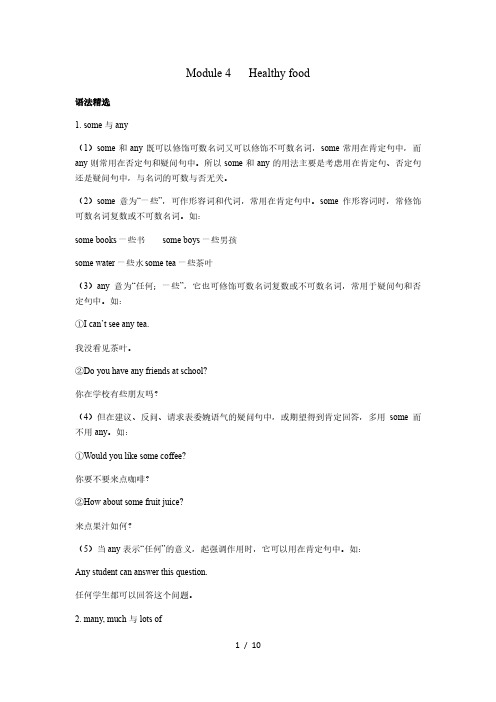
Module 4 Healthy food语法精选1. some与any(1)some和any既可以修饰可数名词又可以修饰不可数名词,some常用在肯定句中,而any则常用在否定句和疑问句中。
所以some和any的用法主要是考虑用在肯定句、否定句还是疑问句中,与名词的可数与否无关。
(2)some意为“一些”,可作形容词和代词,常用在肯定句中。
some作形容词时,常修饰可数名词复数或不可数名词。
如:some books一些书some boys一些男孩some water一些水some tea一些茶叶(3)any意为“任何;一些”,它也可修饰可数名词复数或不可数名词,常用于疑问句和否定句中。
如:①I can’t see any tea.我没看见茶叶。
②Do you have any friends at school?你在学校有些朋友吗?(4)但在建议、反问、请求表委婉语气的疑问句中,或期望得到肯定回答,多用some而不用any。
如:①Would you like some coffee?你要不要来点咖啡?②How about some fruit juice?来点果汁如何?(5)当any表示“任何”的意义,起强调作用时,它可以用在肯定句中。
如:Any student can answer this question.任何学生都可以回答这个问题。
2. many, much与lots of(1)many意为“许多”,用来修饰可数名词复数。
如:①Are there many students in his class?他的班上有很多学生吗?②I haven’t got many English books.我没有很多英语书。
(2)much意为“许多”,用来修饰不可数名词。
如:①We haven’t got much work to do.我们没有太多工作要做。
②Is there much milk in the bottle?瓶子里有很多牛奶吗?(3)lots of=a lot of,意为“许多”,它既可以修饰可数名词,相当于many;也可以修饰不可数名词,相当于much。
- 1、下载文档前请自行甄别文档内容的完整性,平台不提供额外的编辑、内容补充、找答案等附加服务。
- 2、"仅部分预览"的文档,不可在线预览部分如存在完整性等问题,可反馈申请退款(可完整预览的文档不适用该条件!)。
- 3、如文档侵犯您的权益,请联系客服反馈,我们会尽快为您处理(人工客服工作时间:9:00-18:30)。
Module 5
Unit 1 Have we got any oranges
广东 张佳望
Food and drink
fruit
water melon
apple
pear
orange
meat
pork
beef
chicken
fish
vegetables
tomato pl. tomatoes potato pl. potatoes
Listen and check ( ✓) the food and drink they’ve got. ✓ beef oranges □ ✓ pork apples □ melons □ □ onions □ □ carrots □ □ □
✓ milk tomatoes □
chicken □ ✓ potatoes □ ✓ juice
Yes, I have got some books./ No, I haven’t got any books. 是的,我有一些书。/ 不,我没有书。 在表示希望得到对方肯定的回答时, some可用于疑问句中. Could you give me some help ? 你能帮帮我吗?
Can I ask you some questions ? 我可以问你一些问题吗? Could I have some oranges ? 我可以要一些桔子吗?
3. Label the food and drink in
activity 1 with these words .
apple beef carrot chicken juice melon milk onion orange pork potato tomato water
The keys:
He is in good / poor health. 他身体健康/不健康。 ( be in good /bad health身体健 康/不健康 )
2. some 与any的用法 some 和any 都可以表示“一些;若 干”。Some用于肯定句;any 用于 疑问句、否定句、条件状语从句 中。 eg: Have you got any books ? 你有一些书吗?
Important and difficult points
1. healthy adj. 健康的 health n. 健康 The children all look healthy. 孩子们看上去都很健康。 He is healthy.他很健康。
We should keep healthy.
我们应该保持身体健康。
当any 表示“任何”时,可用于肯 定句中,修饰单数名词。 eg: Any boy can do it . 任何小孩都能做这件事。
Pronunciation and speaking Listen and repeat the words in Activity 7. Choose six words in the list in Activity 4. Orange , juice…
Now work in pairs. Ask and say
what Leabharlann ou’ve got.Have you got any … ?
Yes, I’ve got some…/ No, I
haven’t got any …
Wb. Ex. 4 , 5 &6
Listen and read. Betty’s mum: Have we got any juice? Betty: Yes, we’ve got some juice. We haven’t got any milk . Betty’s mum: Have we got any carrots? Betty: Yes, we’ve got some carrots . Have you got any meat ?
a. melon b. apple d. chicken e. beef g. tomato h. potato j. onion k. water m. juice 1. fruit 2. vegetables c. orange f. pork i. carrot l. milk 3. meat
carrot pl. carrots
onion pl. onions
drink
water
milk
juice
Coke
1. Work in pairs. Match the words with the pictures in Activity 1. 2. Label the food in the pictures in Activity 1 with these words. fruit meat vegetables
Betty’s mum: No, we haven’t . Have we got any melons ? Betty: Yes, we’ve got some melons. We haven’t got any apples.
Listen again and underline the correct answers in Activity 6. 1. They’ve got some juice / milk. 2. They haven’t got any carrots/meat. 3. Have they got any melons ? Yes, they have./ No, they haven’t. 4. Have they got any apples ? Yes, they have./ No, they haven’t.
